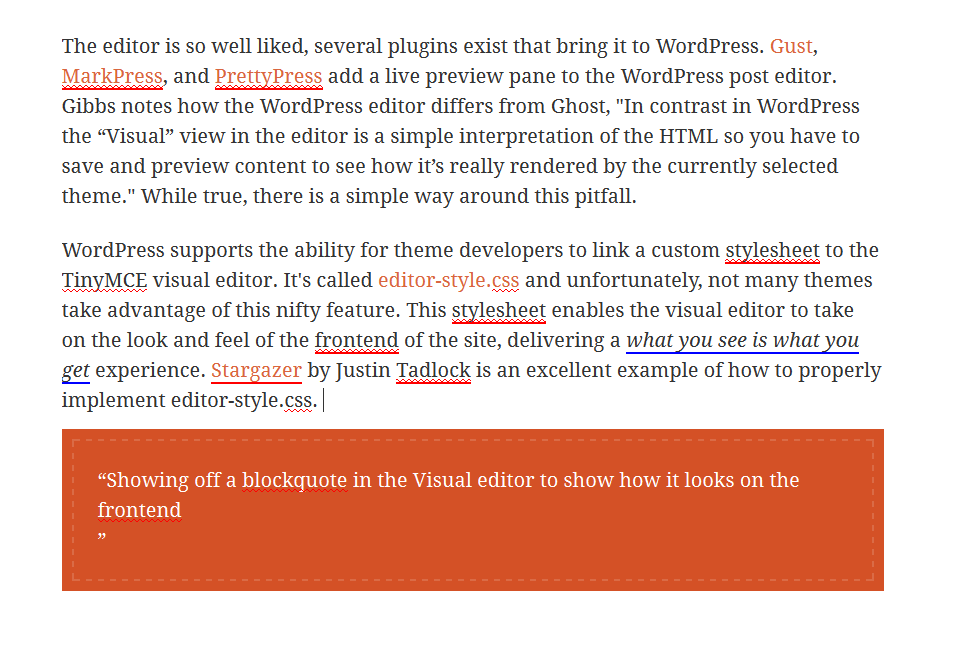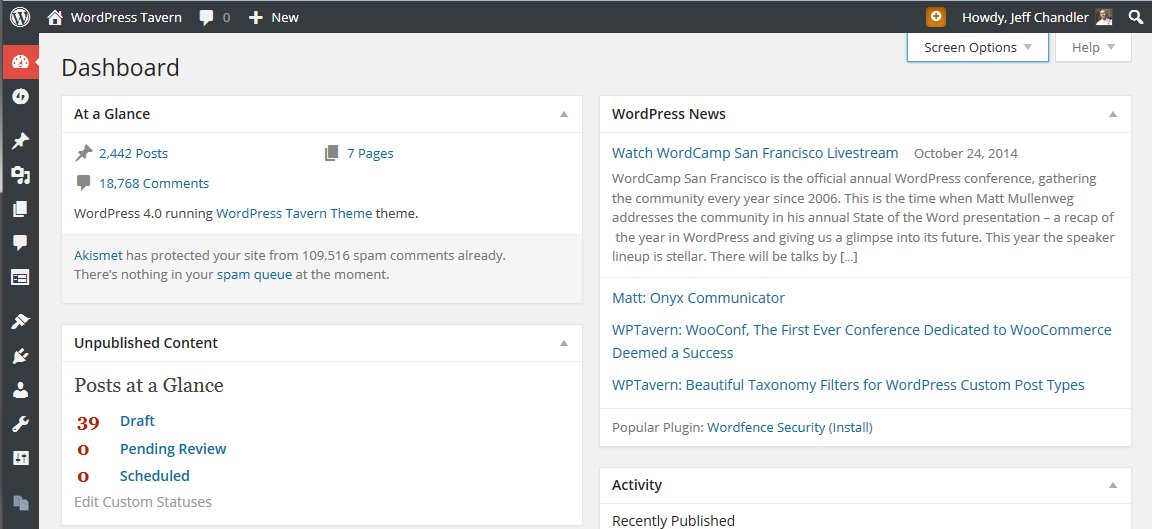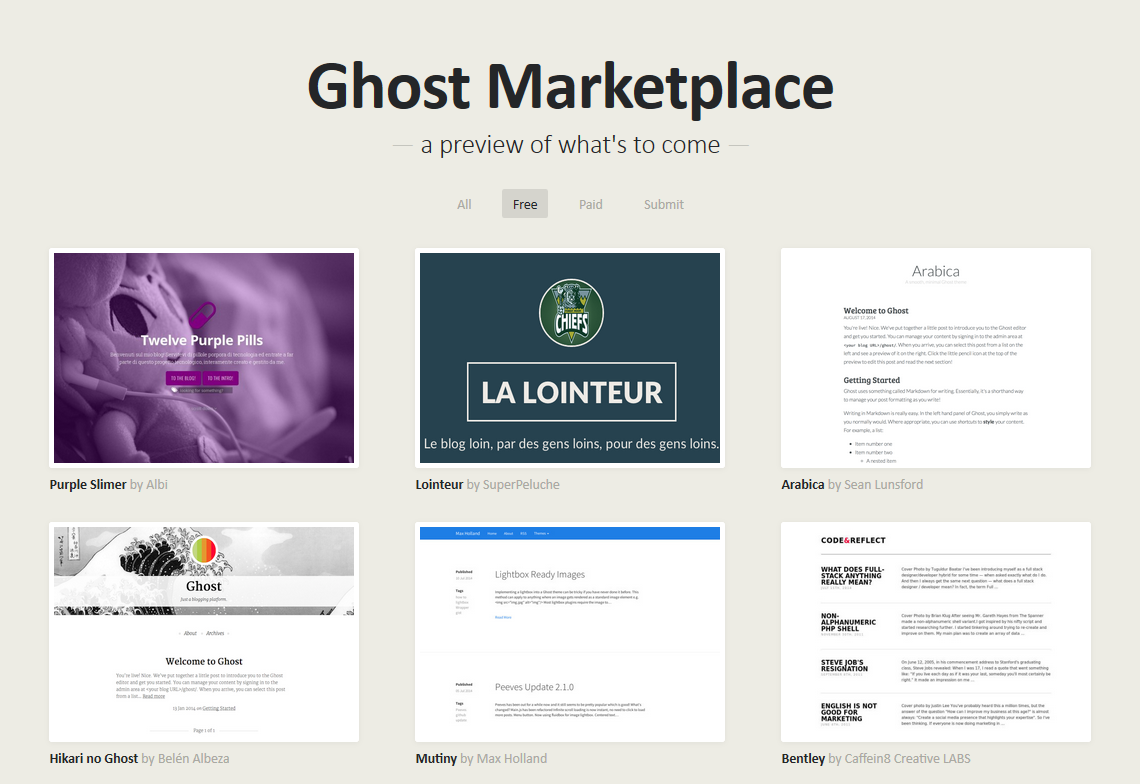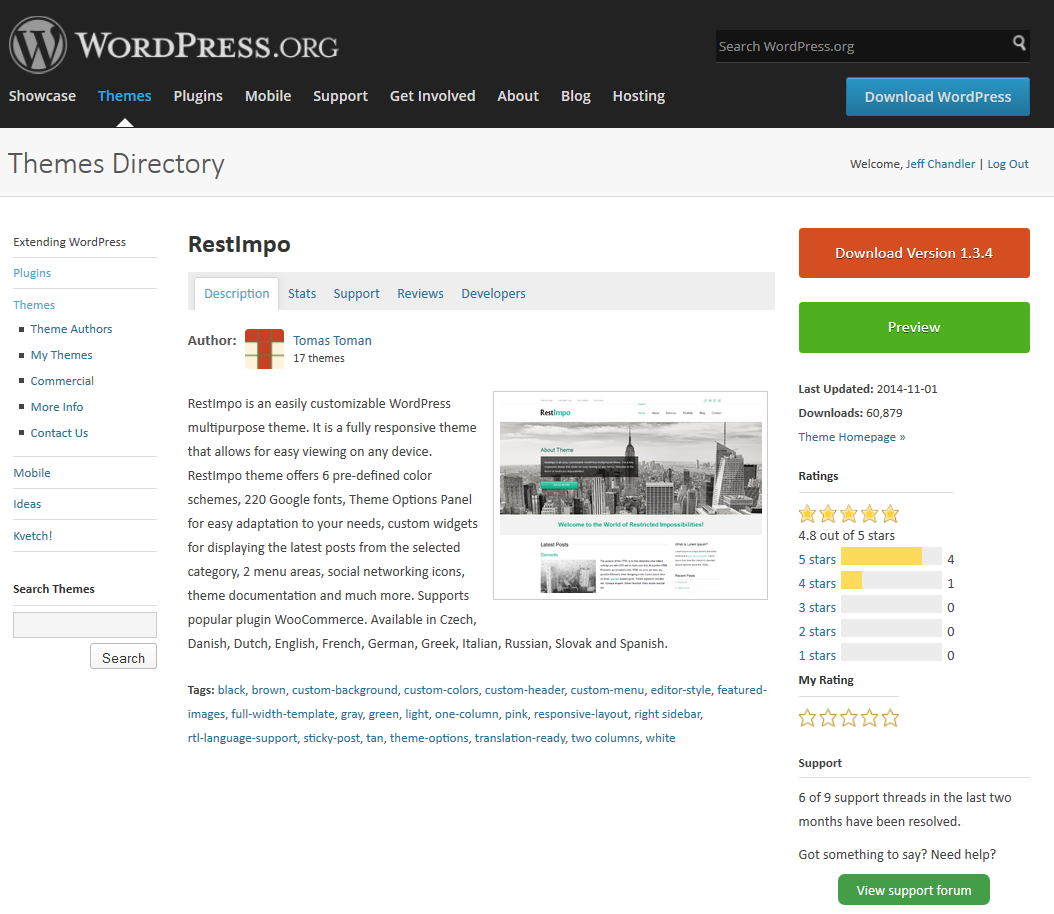
Mark Gibbs, who writes for NetworkWorld, published an article on how Ghost may one day scare WordPress off as the top publishing platform. Gibbs has some valid complaints with WordPress such as, plugins that don’t integrate with the menu system in a consistent way, incompatible themes, and the post editor.
Although Ghost doesn’t have many of the same issues, I think it would if it was around for more than 10 years and its userbase was the size of WordPress. No software is perfect and in an open source environment, users are at the mercy of developers to provide updates to themes and plugins, an action that is not guaranteed.
The Post Editor Comparison
One of the most liked features of Ghost is the content editor. On the left, is the equivalent of the WordPress Text editor where you write content and can apply code via HTML or Markdown. On the right is a live preview that shows how content will look when it’s published. This single editor is like the WordPress Visual and Text editors combined.

The editor is so well liked, several plugins exist that bring it to WordPress. Gust, MarkPress, and PrettyPress add a live preview pane to the WordPress post editor. Gibbs notes how the WordPress editor differs from Ghost, “In contrast to WordPress the ‘Visual’ view in the editor is a simple interpretation of the HTML so you have to save and preview content to see how it’s really rendered by the currently selected theme.” While true, there is a simple way around this pitfall.
WordPress supports the ability for theme developers to link a custom stylesheet to the TinyMCE visual editor. It’s called editor-style.css and unfortunately, not many theme developers take advantage of this nifty feature. The stylesheet enables the visual editor to take on the look and feel of the frontend of the site, delivering a what you see is what you get experience. Stargazer by Justin Tadlock is an excellent example of how to use editor-style.css.

Though the addition of editor-style.css doesn’t make the editor perfect, it vastly improves the writing experience. Having the content in the editor look the same as the final result is a huge convenience. Thanks to improved oEmbed previews in WordPress 4.0, the Visual editor is the default view when I write content.
The Text editor still has its use, especially when a snafu occurs in the Visual editor but I think in the future, the Visual editor will improve to the point that the choice between Text and Visual will disappear. In the decisions not options approach, there will be one editor to rule them all. Between the custom stylesheet and improvements to the visual editor, I believe the writing experience in WordPress is superior to Ghost.
The Ghost Dashboard
One of the other highly touted features of Ghost is its beautiful, non-existent dashboard. Gibbs notes that themes and the backend of Ghost are fully responsive. A note to Gibbs that the backend of WordPress is also fully responsive. The following image from the project’s Kickstarter page was enough to convince some people to back the project.
To this day, Ghost doesn’t have a dashboard but it’s coming. I admit, the concept images of the dashboard are pretty, colorful, and display information in squares instead of big rectangles. The question I have is whether the actual implementation will look anything like the screenshot.

The WordPress Dashboard in comparison looks old but gives you the ability to arrange items the way you see fit. I’m not sure what can be done to make the dashboard pretty. With the eventual inclusion of the REST API to WordPress, we’ll likely see hundreds of different interpretations of not only the backend of WordPress, but the dashboard as well.

The Third Party
Gibbs highlights the fact that the number of third-party themes for Ghost continues to increase. Meanwhile, there are those in the WordPress community who think themes have become a commodity. With WordPress now over 10 years old, there are plenty of free and commercial themes to choose from.
Ghost has a marketplace available which lists free and commercial themes. The biggest difference between it and the WordPress Theme Directory is the inconsistent way of displaying and locating a theme. Ghost doesn’t have an official directory to host themes. Listing themes created by the community instead of hosting them takes away the ability to create a consistent user experience.

When browsing themes on the marketplace, each listing takes you to a theme’s Github page, a site using the theme, a 404 page, or somewhere else on the web. While most of the Github pages for Ghost themes display information in a consistent manner, I prefer the browsing experience on the WordPress Theme Directory.
With the WordPress Theme Directory, I trust what I’m downloading as the code has been vetted, especially if it’s a recent addition. Information containing the version number and the average rating is consistently in the same location. The preview link is an added bonus but previews need work as they don’t always accurately render a theme.

Ghost is a Long Way From Scaring WordPress
Gibbs ends his article by saying, Ghost “has to be one of the most powerful and best engineered blogging platforms ever.” While I think the jury is still out on whether it’s the best engineered platform available, there is so much that goes into the success of an open source publishing system that it alone won’t propel the platform past WordPress. Ghost has the luxury of a fresh start and the opportunity to build a rock solid foundation for the platform’s future. However, it’s going to take more than that to knock WordPress off its pedestal.
In its current form, Ghost satisfies an audience that wants a simple, frictionless, publishing experience. Ghost delivers but without a robust third-party ecosystem, I don’t see how it will ever reach the same plateau of WordPress. That’s not to say Ghost can’t or won’t be a successful project, it’s just that I don’t see it being used on 20% of the web.
It’s early and Ghost has a long way to go before it hits the pivotal 1.0 milestone. The items listed on the project’s roadmap indicate a lot of cool features are on the way. But for now, Ghost doesn’t have or do anything that WordPress should be afraid of.
Thanks for the update on Ghost Jeff.
I remember hearing about it and then nothing… obviously it’s still out there but with 10 years catching up to do.